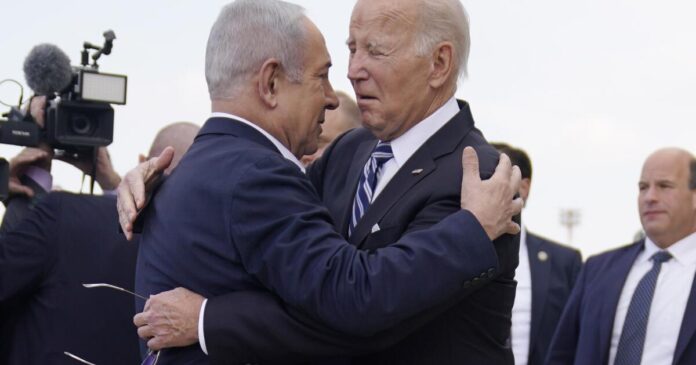One can understand why President Biden, after sticking his political neck out for Israel for months, is reportedly frustrated with Israeli Prime Minister Benjamin Netanyahu. Rockets were still falling on Tel Aviv when Biden visited Israel to show support. He sent U.S. armed forces to the region to deter Hezbollah and, more recently, beat back Houthi piracy. He pushed for billions of dollars in additional military aid and backed Israel’s war in Gaza even as it became increasingly unpopular.
In exchange, Biden has asked Netanyahu to commit to a Palestinian state once the Israel-Hamas war ends. And Netanyahu just publicly said no.
The United States is now reported to be actively engaging with other leaders and parties in Israel about the future of Gaza and the Palestinians at large. The problem is that opposition to a Palestinian state stretches well beyond the prime minister’s office.
Netanyahu undeniably has his own reasons for rejecting Palestinian statehood. His government relies on the support of ultra-right-wing parties that advocate expelling Gazans from the strip en masse. If he backed Palestinian statehood, the coalition would shatter and his government would collapse. And polls suggest that if new elections are held, Netanyahu will be out of a job and facing legal woes.
Then there are the broader practicalities of implementing a two-state solution, demarcating everything from water rights to airspace and carving out the geography “from the river to the sea” without bisecting Israel in the process. The most daunting political problems would be relocating the 700,000 Israeli settlers in the West Bank and the eternal challenge of dealing with Jerusalem.
But there is also something deeper behind Netanyahu’s opposition: a fundamentally different conception of the root cause of the Oct. 7 massacre and the current war.
In the American narrative, the context of Oct. 7 is the failure of the 1990s-era Israeli-Palestinian peace process. In this telling, Israel’s “mowing the grass” approach — killing militants without simultaneously providing Palestinians with real political or economic opportunities — was bound to fail. Peace therefore begins with providing those opportunities and a path to a two-state solution.
In Israel’s version of events, the error was Israel’s 2005 withdrawal from Gaza, which gave Hamas a sanctuary to plan, train for and ultimately launch a relatively unimpeded attack on Israel. Israel notes that it not only allowed but encouraged Qatar to funnel money to Gaza to improve living conditions, some of which was probably spent on weapons. Israel also contends that work permits allowing thousands of Gazans to earn higher wages in Israel became a means for Hamas to gather intelligence.
In Israel’s view, a two-state solution would only compound this problem. The Palestinian Authority is widely viewed as weak and corrupt; nearly 9 in 10 Palestinians want its president, Mahmoud Abbas, to resign. Meanwhile, 57% of Gazans and 82% of West Bank Palestinians approved of Hamas’ October attack, and overall support for the group has increased in both regions.
So, Israel asks, what would prevent Hamas or a similar group from usurping control of a Palestinian state much as they did in Gaza?
This is not just Netanyahu’s view but Israelis’ view. Support for a two-state solution among Israelis has been declining for a decade, according to the Pew Research Center. In a survey conducted several months before the Hamas attack, a mere 35% of Israelis thought two states could “coexist peacefully.” As Israeli President Isaac Herzog remarked in Davos recently, no Israeli “in his right mind” is willing to think about peace agreements. Even if Netanyahu were to depart from the political scene, such Israeli opposition may remain.
This leaves the United States with few levers to pull. It can offer plans for redrawing the map, but that won’t get to the heart of the matter. It can promise incentives such as normalization of relations with Saudi Arabia, but the fear of another Oct. 7 will trump any potential benefits. Conditions can be attached to U.S. military aid, but that’s liable to exacerbate Israeli insecurities and, as a consequence, intransigence.
Perhaps the path forward is to start smaller. As Herzog noted, the average Israeli “wants to know: Can we be promised real safety in the future?” After the trauma of Oct. 7, it will take time to build such confidence. But his framing hints at where to start.
Israel’s military leaders have argued that its security requires planning for the war’s end and rebuilding Gaza. Netanyahu has resisted any such discussion, but American pressure might change his calculus. Done right, reconstruction could foster the mutual trust necessary for a more lasting political settlement.
Such incrementalism is bound to frustrate everyone — certainly Palestinians who yearn for statehood as well as right-wing Israelis who resist any thought of rebuilding Gaza, but also the Biden administration, which would prefer a big win in this election year. But like any number of previous presidents, Biden is learning that while the dynamics of the Middle East may change, frustration is a constant.
Raphael S. Cohen is the director of the Strategy and Doctrine Program of the Rand Corp.’s Project Air Force.



